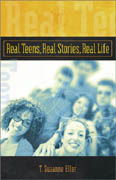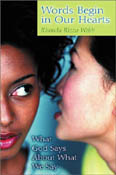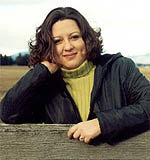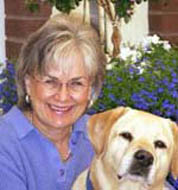
for women who touch the hearts of other women for Christ
October 2003
|
|
Vol.
3 Num 6 , October 2003 |
|
TABLE
OF CONTENTS
In this
issue: Right From My Heart by Linda Evans Shepherd,
publisher Love Notes by Rebekah Montgomery, editor Words for the Wise: Quotes you can use Leading Hearts by Kris Bearss Readers Write Program Ideas Feature From the Bookshelf |
 |
 |
The
Gospel According to Little Red Writing Good
|
|
|
Once upon a time there was a young girl named Little Red Writing Good. Little Red Writing Good acquired her distinctive name because she wore her occupation — author, speaker, and women’s ministry director — along with the bright red fleece of the Lamb here, there, and everywhere to the point that she was known by it and her name was forgotten. Temptation 1: Beware of adopting the identity of a “professional Christian” while losing your relationship with God. Temptation 2: Beware of constantly playing the role of “professional Christian.” It will render you unable to relate to others. Many women’s leaders are out of touch because they have no friends except other ministry professionals.” One day, Little Red Writing Good was sent to minister to her ailing grandmother. With the prerequisite gift basket dangling off of her arm and her heart brimming with good intentions, she tripped off into the woods on her errand. The warnings of her mother rang in her ears: “Stay on the straight and narrow path!” “Don’t talk to strangers!” “Beware of the Big Bad Wolf!” Temptation 3: Beware of ministering alone! Find prayer and accountability partners who will walk through the dark times with you. For a while, Little Red Writing Good made progress. Although the path was narrow and rough, with butterflies flitting, birds singing, and flowers blooming, it was so pretty in the woods that she forgot her mother’s warnings. Temptation 4: Despite airport delays and the hassle of travel, it can be very flattering to be fawned over and feted. Beware that attention doesn’t turn your eyes off your mission! Then out stepped the Big Bad Wolf. “Where are you going, Little Red Writing Good?” he asked. Forgetting to be cautious and happy to bear witness to her mission, she replied, “I’m going to visit my grandmother. She’s ill and I’m taking her this gift basket of goodies.” Temptation 5: Do not assume every opportunity to further your ministry is from God. Some great opportunities are only placed in your path to divert you from God’s true calling — to be an obedient, loving child of God. “Hmmm! Let’s see what you have in your gift basket,” said the wolf, pushing aside the cover. Temptation 6: Beware of Satan’s questioning of the sufficiency of God’s spiritual gifts to you. Be certain of your calling and mission: trust God to supply the gifts. The Wolf studied Little Red Writing Good’s basket. His mouth watered as he thought of devouring the girl and her gifts. “Wouldn’t your grandmother enjoy a bouquet of flowers? The prettiest flowers grow off the path!” he suggested. Little Red Writing Good looked at the flowers nodding in the distance. They DID look brighter and fresher than those growing along the path. Perhaps… Temptation 7: Beware of “No,” said Little Red Writing Good. “I won’t be sidetracked or misled. Grandma is waiting.” So Little Red Writing Good stayed on the straight and narrow path and delivered her gifts to Grandma. And she and Grandma truly lived happily and eternally ever after! Attention: Writers, speakers, teachers, pastors, and women who love the Bible! Now is the time to make your knowledge of the Word come alive by learning the Bible in the land of the Bible. Rebekah Montgomery, editor of Right to the Heart of Women Ezine, in conjunction with Jerusalem University College are hosting a seminar created especially for you in Israel from March 20 to April 11, 2004. For more information, contact Rebekah at rmontgomery@rebekahmontgomery.com |
|
| Need just the right phrase to make the point? Try these! | |||
 |
 |
||
|
To make the choice to rejoice and tame that monster of discontent,
we must recognize the Source of our strength: God is at work in us. God wants strong women. But unforgiving, feminist attitudes do not
produce strength; they hinder growth and fruit. Feminism often justifies
its hard attitudes as “righteous indignation” over the behavior of
men. But “righteous indignation” is often a euphemism for “rationalized
unforgiveness.” Everyone tormented by worries wants peace. But as I learned, we
will not have peace during troubled times unless we have a thankful
heart. The main problem for women is not independence but serving inappropriately.
Women have traditionally been the servants of the world. Serving
has become almost instinctual. This does not mean, however, that
we instinctively do it right! Jesus’ servanthood was completely unexpected.
That’s what made it radical. Whenever we get bitter and upset about a difficult situation, we
need to end up on our knees, bringing the whole matter to the cross
of Jesus Christ. There, the Son of God hung naked while He died in
the most excruciating way possible, yet He gasped words of forgiveness. |
|||
|
|||
 
Writes C. Hope Flinchbaugh: Hebrews 12:15 says, “See to it that no one comes short of the grace of God; that no root of bitterness springing up causes trouble, and by it many be defiled.” Bitter roots bear bitter fruits such as anger, resentment, judgments, and frustration at unmet expectations. Bitterness (even against a person who is totally at fault) causes trouble. If we hold onto unforgiveness, others around us pick up on our bitterness and it can infect them. It’s like having poison in the house and we should do anything we can to get rid of it! Forgiveness is not a feeling; it’s an act of faith. It isn’t as impossible as it sounds. We can and should forgive by faith, even if our emotions haven’t caught up to God’s command to forgive. We can stop the root of bitterness by praying, “Father, by faith in Your power to do this, I forgive my husband for betraying me and being unfaithful. And Lord please forgive me for hating/judging/resenting my husband.” After forgiving him by faith, we should pray for him, and when we’re ready, ask God to show us something kind we can do or say that will demonstrate our forgiveness. Your precious children may be quietly wondering if it’s their fault that Daddy left. Small children are concrete thinkers. They don’t have the ability to distinguish the reasons behind their separation from their father. One way to help them understand is tell them, “Daddy’s heart is sick right now and he doesn’t want to talk to God. Sometimes he doesn’t want to talk to us either. We need to pray for Daddy that his heart won’t be sick anymore.” There is a painting of a prodigal son collapsing into the embrace of Jesus. This would be a good picture to hang low enough for your children to see when they pray for their daddy. It can be a solid point of contact to build faith for Daddy’s return to Jesus. If at all possible, have them spend time with biological or spiritual grandparents whose marriages are working. They need to see a solid male role model during this difficult period. One last thing: If trustworthy people offer to care for your children, take them up on it. If no one has offered, seek childcare help from close family members or church friends. Give yourself time away from responsibilities to grieve, breathe, and regroup your thoughts and friendships Do you have a question
that you’d like addressed by AWSA (Advanced
Writers and Speakers Association)? Email your question to rmontgomery@rebekahmontgomery.com.
Your anonymity will be protected. |
| |||||
There are specific things you should not say to a woman who has
lost a baby: There are some wonderful ways to help heal. First, pray for them and tell them that you are. Send a card or flowers. Be available to run errands. Offer to listen. Remember the anniversary of the pregnancy loss and the due date. When the estimated birth date arrives, it brings a flood of memories, reminding the parents of the destroyed hopes and dreams. Send a bouquet, cook a meal, or call and assure the couple that you’re thinking about their loss. Realize the impact Mother’s Day has on infertile women and those who have lost a child. A beautiful gesture is to have a special Mother’s Day corsage or single white rose available for women who have suffered these tragedies. If a couple you know has suffered a pregnancy loss, ask the Lord to give you sensitivity to their situation. After all, the exact words you say are not as important the heart from which they come. … in reaching post-abortive women …By Tricia Goyer: My hands trembled. I was sure everyone around me could guess my secret. Yet a flicker of hope stirred. There’s someone like me — someone who knows this pain. I’d been a Christian for years, but the shame of an abortion at 15 heavily weighed on my heart. I had no idea other women also dealt with the same heartache. Women Like Me Post-Abortion Healing Steps to healing.
… in moving beyond divorce …By Kari West: Divorce punctured my soul as I packed away a lifetime of photo albums under the mental label of "Who I was." I questioned myself: Did unconditional love blind me to his fault? Why was I so naive? Could I ever trust again? My former spouse and others discounted my pain. "Forget the past. Get on with your life," they advised. "Pray and read your Bible more. God has a ministry for you," a friend says. No one understood: I wanted my marriage and lifestyle back — not a ministry. As you begin to pick up the pieces and live with what you have left, you can’t believe your former spouse is uncooperative, doesn’t wish you well, and treats you as a stranger. You feel vulnerable because this person knows how to wound and agitate you. Your mind is sunburned with thoughts too sensitive to touch. You experience anger as one flesh separates into two single-again individuals. Maybe your former spouse is not-so-single, already snuggling in the arms of another, and your children blame you. This isn’t how you planned your life. You trusted God and you’re angry at Him. Where was He? Four Ways to Handle Divorce Anger
… in starting a Bible study …Excerpts from Women’s Ministry Handbook by Carol Porter and Mike Hamel, Chariot Victor Publishing. Used with permission. Begin with at least two women committed to the leadership of the Bible study. Pray fo others to join you on the leadership team. Five regular attenders are adequate to start a study group. Determine whether the primary goal is to nurture believers of reach the lost. Although Bible studies traditionally begin in the fall, with adequate publicity, you can start successfully at other times. Take the local school schedule into account. An informal telephone survey will help you choose the best time and day for the study. The best place to meet is usually at the church itself. This makes assimilation into the church fellowship a natural step for newcomers. Here are some possibilities for a format:
Two-hour meeting options
You may contribute to What Works by emailing rmontgomery@rebekahmontgomery.com. If we use your program or ministry tip, you will receive a FREE book of our choice. |
Soul
Sister — Developing a Trustworthy Ministry Confidante
By
Rebekah Montgomery, editor
Moses had Aaron and Hur to hold up his hands. St. Paul had Pricilla and Aquilla. Jesus had Peter, James, and John. Even the Lone Ranger had Tonto. Some call them “prayer partners” or “accountability partners,” but behind every successful leader are one or more co-laborers who provide moral and prayer support. Here are some guidelines to finding the right people to hold up your hands as you fight the good fight.
- Pray and ask for a soul sister. God knows who needs you and whom
you need. Like Eliezer seeking a mate for Isaac, God will guide you to
that person or persons and you will recognize each other.
- Choose either a married couple or someone of the same gender. Do
not — and I emphatically repeat this — do not pray alone with someone
of
the opposite sex unless that person is your mate, your biological son
or brother, or father! To pray alone with someone of the opposite sex
opens you up to vulnerabilities of the most intimate nature.
- Go slowly and give the relationship and trust time to develop.
Sometimes it takes a while for people to click. Caution and reserve
is almost a
hallmark of women leaders because of the tremendous amount of criticism
that is often leveled at them and the sensitive nature of the personal
information entrusted to them. Take it slowly.
- Expect disappointments. Aaron and Miriam abused their close relationship
with Moses by criticizing his wife. The disciples slept through Jesus’
Gethsemane experience. Your prayer partner will be human and fallible.
And aren’t you glad since you are too?
- Be sensitive to her time; be faithful to your schedule. I once
had a wonderful soul sister who had oodles of time. Unfortunately,
I did
not — but she couldn’t hear a hint or a plain statement of time restraint.
I had to find a soul sister who wanted to pray and work, not pray then
chat and chat and chat. She needed a soul sister who had more time.
- Don’t gossip. When you finally find someone whom you can trust,
it is tempting to download all of your disappointments and slights.
But
do not share names and specific situations unless absolutely necessary.
- Don’t substitute your soul sister for your mate. This can be easy
to do, especially if your marriage partner is on a different plane
spiritually or emotionally. Instead, continue to pray that your husband
will become
your spiritual head and emotional support and let your soul sister
be your prayer partner.
- Do more praying and less talking. State your needs, explain how you believe the Lord is leading, and let your soul sister pray for you. Listen to her with the purpose of identifying how to pray for her.
Be quick to pray for and with another sister, even if you are not “officially” soul sisters. We are instructed to bear one another’s burdens to fulfill the law of Christ to love one another.
|
This WOMEN WHO MINISTER TO WOMEN~Right to the Heart of Women E-zine is sent only to subscribers.
How to subscribe...Join our Right to the Heart of Women Ezine by clicking on the button below.
PRIVACY STATEMENT: We will not distribute your address to anyone. PERIOD!
Right to the Heart of Women is a FREE publication brought to you by Right to the Heart (TM) Productions. Right to the Heart is a 501 (c) 3 nonprofit ministry which specializes in encouragement through the daily one-minute radio program, hosted by Linda Evans Shepherd, as a nationally syndicated feature. For more information on the radio feature, please visit https://righttotheheart.com
- Please pray for the multi-facets
of this ministry (administration, finances, radio, conferences, books,
events, online loops, and newsletters.)
- Pray that we will have
an impact on women for Christ and that God will complete the work
He has called us to do.
- Pray the radio ministry
will have an impact for Christ and lives will be touched and changed.
- Pray for Linda and her
family.
- Pray for the health care
professionals who help care for Linda's invalid daughter.
- Pray for the people who
work for and with this organization.
- Pray for our nation and
pray God will replace EVIL with REVIVAL.
Please email if you would like to join Linda's prayer team.
COPYRIGHT notice: Submission of an e-mail message affirms that you are able to and have given Linda Evans Shepherd non-exclusive permission to reprint the content of your message in all forms, electronic or otherwise, in all languages throughout the world. Copyright 2003, Right To The Heart. Permission must be granted to reprint any item (other than your own posting).
INVITE A FRIEND
Please RECOMMEND Right to the Heart of Women to others!
If you are
Christian women author who has published at least two books that
appear in Amazon.com and you speak across state lines at least three
times a year, consider joining AWSA (Advanced
Writers and Speakers Association). Go to righttotheheart.com
and click on author and follow the prompts for an application. THANK
YOU FOR READING TO THE END!
Blessings,
Linda Evans Shepherd (C) Right to the
Heart (tm) Productions 2003
PRIVACY STATEMENT: We will not distribute your address to anyone. PERIOD!
RTTH home | women | e-zine | authors | women's survey | write away











 Real
Teens, Real Stories, Real Life by T. Suzanne Eller
Real
Teens, Real Stories, Real Life by T. Suzanne Eller Words
Begin in Our Hearts
Words
Begin in Our Hearts When
I God on the Highway to Heaven I Didn’t Expect Rocky Roads
When
I God on the Highway to Heaven I Didn’t Expect Rocky Roads







